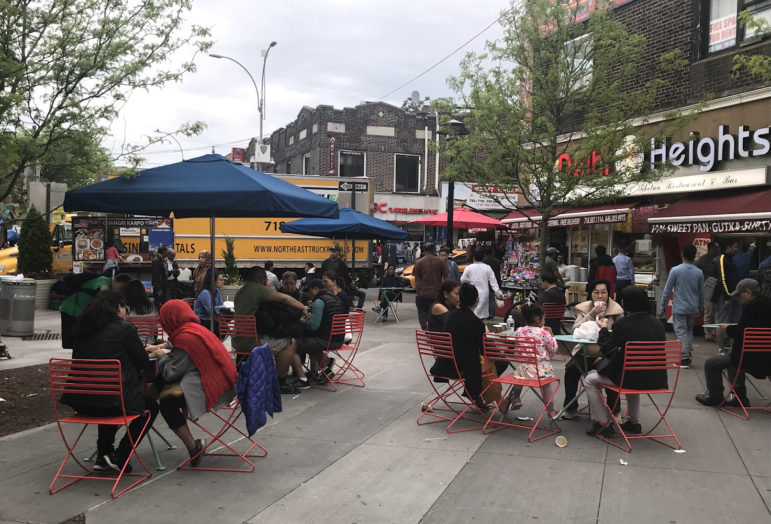
City Limits/Sadia Haque
Jackson Heights’ Diversity Plaza in Queens Community Board 3, which recently started a new committee to address the needs of the neighborhood’s immigrant residents.
This story was produced through the City Limits Accountability Reporting Initiative For Youth (CLARIFY), City Limits’ paid training program for aspiring public-interest journalists.
New York is a city rich with diversity — and Community Board 3 of Queens is looking to give its immigrant residents a greater voice.
Queens CB 3, where more than half the population is foreign-born, recently created a new committee to bring attention to issues affecting immigrants in the community, including affordable housing, senior housing, public transportation and adult English education.
The board — which represents residents in the neighborhoods of Jackson Heights, East Elmhurst, and North Corona — introduced the new Committee for Immigration Affairs in March, and it held its first official meeting on May 9. The committee is led by board member Lobsang Salaka, who is an immigrant himself as well as a veteran.
“I am myself immigrant, I know what it means to be an immigrant,” says Salaka. “We need a committee to build relations among various ethnic backgrounds and have a dialogue to promote our interest.”
CB3 is known for its diversity: both Corona and Elmhurst are among the New York neighborhoods with the most immigrants, according to city data. Jackson Heights is home to Diversity Plaza, a two-block pedestrian walkway on Broadway and 37th Road that was named to honor the neighborhood’s role as “crossroads of the world.”
“We have people who speak different languages and have different cultures,” says Salaka. “It was long overdue to have an immigration committee.”
The committee currently consists of nine board members, who have already created an agenda for the coming months, according to Salaka, though a monthly meeting time has not yet been decided on.
The board was inspired to start the new committee, in part, because of the current political climate, says Salaka. He believes it’s the board’s responsibility to help people come together and work through the issues they face as a community.
Although they’re just getting started, Salaka has already come up with ideas to get more members of the immigrant community involved with CB 3: He wants to hold culture fairs as well “Immigration Story Sharing” events where people can share their immigration stories.
Salaka hopes the new committee will allow more people in the neighborhood to have their voices heard.
“This committee is to identify problems and issues and raise [our] voice as a team,” he says. “We are here to show that immigrants are here to build the nation.”









2 thoughts on “Queens Community Board Launches New Committee to Address Needs Of Immigrants”
How about the needs of our citizens?
Democrat 2020 Platform & Goals:
-Open Borders.
-Sanctuary Cities.
-Elimination of ICE
-Disarming Americans.
-Infanticide.
-Voting rights for illegal aliens.
-Pack the courts with radical liberal judges (Like the 9th circuit)
-Increase refugee’s from the third world.
-Illegal aliens allowed to hold public office.
-Socialism.
-Free Abortions for all (Taxpayer funded)
-The green new deal.
-End of Electoral College
-Free Medicare care for all including non citizens (taxpayer funded)
-Raise Minimum Wage
-Have adolescents vote
-!00% free college for all, including non citizens. (tax payer funded)
-Reparations for every race “harmed” by the white man.
-Convicts, Terrorists voting.
-Susie & Bobby using the same restrooms.
-Late term abortions.
-Pay check for every person in the US even if they choose not to work.
*Sources: Straight from the Democrat’s mouths.
I doubt you could actually source many of those positions to Democratic candidates. But let’s take you at your word. Wouldn’t many of those items–gun control, progressive courts, environmental protections, fairer elections, more efficient healthcare, higher wages, free college, racial justice, protections for transgender people and access to reproductive healthcare–address “the needs of our citizens”? At least some of them? I seem to recall U.S. citizens asking for many of those things. Just because you don’t want it doesn’t mean only “illegal aliens” would benefit from it, Allison.